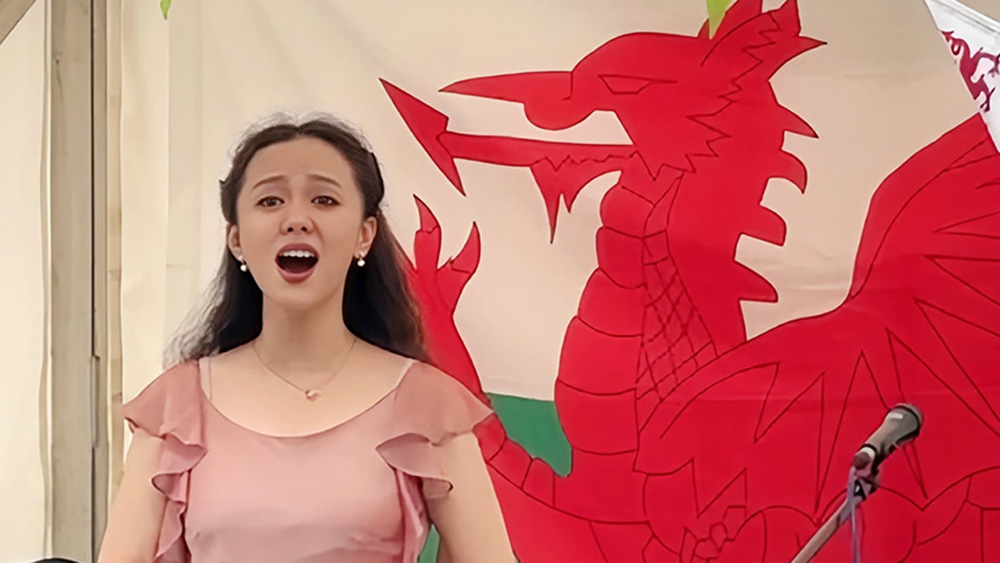2025 marks the 10th anniversary of Welsh Language Music Day. Can Welsh music help secure the language’s future?

Mared stands on the stage at the Wales Millennium Centre, singing in Welsh. The theatre is full, and the audience watches closely. The music starts, and her voice fills the space. The orchestra plays, and the other performers join in. The sound of the Welsh language flows through the whole theatre. The story of the musical unfolds as Mared sings each line. The performance continues, bringing the Welsh legend to life through music and rhythm.
“I think music is the perfect way to share the language. As it doesn’t matter if you don’t understand the lyrics, you can still hear the feeling of it in the music,” said Mared Williams, a singer songwriter, the winner of the Welsh Language Album Awards in 2021.
In 2023, the epic Welsh-language musical Branwen Dadeni was performed at the Wales Millennium Centre, with Mared leading the cast. The musical is based on the ancient Welsh myth, and she gave an outstanding performance.
“It was an amazing experience. I felt some pressure as I knew people would have their expectations and their assumptions of what the show would be like, and it was incredible to see the theatre at the Wales Millennium Centre full of people to watch a fully Welsh language show, and I hope more people will write shows and be able to partner up with the theatre in the future,” said Mared.
The Welsh language is not widely spoken, and there is a risk that fewer people will use it in the future. However, some musicians are now learning Welsh and singing in the language. Their songs reach more people and bring Welsh into new spaces.
Through music, more listeners hear the language, and some may become interested in learning it. This could help keep Welsh in use and support its continuation over time. In Pembroke, around 1,500 children participated in this year’s Welsh Language Music Day, early exposure to Welsh-language music may help them develop a connection to the language.
“When I was very young, I heard a song by Welsh singer Charlotte Church for the first time, and I immediately fell in love with Welsh-language music, because it sounded so beautiful. Since then, I started learning Welsh so I could sing Welsh songs by myself,” said Yingzi Song, a Chinese freelance musician based in Cardiff.
After moving to Cardiff to study, Yingzi Song performed Welsh verses for the first time at the National Eisteddfod of Wales (a festival celebrating Welsh arts, language, and culture). Her precise pronunciation and expressive performance received positive feedback from the crowd.

In recent years, a new wave of young Welsh-language musicians has emerged, gaining traction on social media and performing worldwide. Through their passion, they showcase the beauty of the Welsh language and inspire more artists to learn and embrace it.
Welsh-language events like the National Eisteddfod of Wales and Welsh Language Music Day have long enjoyed strong attention across Wales, attracting many singers to take part in these cultural celebrations. And this year marks the 10th anniversary of Welsh Language Music Day, making it an important milestone.
“There is definitely a rise in interest in the Welsh language, with partnerships being made at music festivals and expos across the world more recently,” said Mared.
Yingzi Song developed an interest in learning Welsh through music. She started by looking for Welsh learning resources online, and after moving to Cardiff to study vocal music, she began looking for more effective ways to learn the language, such as practicing conversations with native Welsh speakers to improve her pronunciation.
“For me, the hardest part of learning Welsh was the pronunciation and grammar, because it’s so different from English and Chinese. But with help from my teachers and friends, my pronunciation improved a lot, allowing me to sing Welsh songs more confidently,” said Yingzi Song.
“Much of Welsh-language music consists of ancient poems, often describing rural landscapes. So, learning Welsh music not only helps you learn the language but also teaches you about Welsh culture,” said Yingzi Song.
Apart from non-native speakers learning Welsh on their own, more singers from Wales are choosing to write songs in their first language. They perform on stage, share recordings online, and join radio broadcasts. They meet and present their work together. Through these actions, more people hear the language and learn about it.
“As I grew up speaking Welsh, I don’t necessarily choose to write a song in Welsh, sometimes it just happens. However, it definitely feels like a truer version of me when I write a song in my mother tongue. And the Welsh language music scene is very supportive and welcomes more Welsh language songs, because the revival of the Welsh language during 50/60s was closely related to the music of that time,” said Mared.
For Mared, using social media to promote Welsh language music is a way to share the language with more people. In her Welsh music videos, she adds subtitles so non-native speakers can follow the lyrics.
“I think captioning is great, as it makes it accessible, Otherwise it’s just a natural part of me. I would hope that I engage an audience through bilingualism, and it’s really lovely to see Welsh learners contacting me for translations for my songs as they continue their learning journey,” said Mared.
